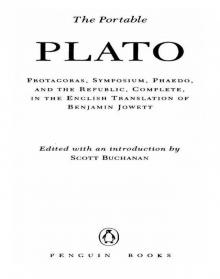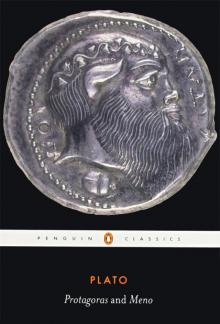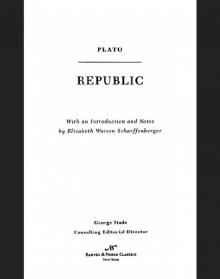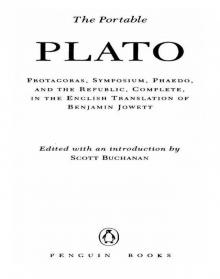The Portable Plato Read online
Page 3
But the catalyst in this human alchemy is the ironic hero who holds the secret for all the other characters in the play and for his audience. He has somehow received the sign, as Socrates did from the Delphic oracle, that he is wise, he has taken it as a riddle, and has looked for the answer. The answer is that he will be wise if he learns that he knows nothing. These are stage directions for the comic actor; he is to play the fool. So much will make a comedy provided he does not completely discount the truth or probability of his folly. If, as Socrates did, he lends his folly an ever-deepening truth, he will raise the comedy as far as his learning ignorance will go with him. This is the secret of the writing and the reading of the Platonic dialogues. They are comedies, and Socrates is the archetypal comic hero of all time.
The key to the comic character and the ironic role of Socrates in the dialogues is in the inscription borrowed by Socrates from the temple of Apollo at Delphi and appropriated by him as the ruling principle of his life: Know thyself. He coupled this with a hypothesis, also provided by the Delphic oracle, that he was the wisest man in Greece. He reported these two facts to his judges in the Apology, and interpreted them to mean what he had discovered for himself: he was wise because he knew that he did not know. “I know that I do not know” contains a pun as it is pronounced in Greek. As it is written with a choice of accents, spacing and emphasis, it can mean three things:1. I know that I do not know.
2. I know what I do not know.
3. I know whatever I do not know.
It can even mean “I know because I do not know.” It suggests that the study of ignorance is the beginning of wisdom.
The punning proverb is a powerful formula if it is taken, as Socrates took it, as a hypothesis to be verified by a life of inquiry. It is also a powerful piece of ironic thought to be put to use in comic drama. In the early dialogues it is tried on professional poets, priests, military men, and politicians, whose opinions blossom quickly into a pretense of knowledge. It is tried on professional wise men, the sophists who are the professors of the day, and whose scholarship, as always, pretends both knowledge and humble ignorance. It is tried on starry-eyed young men who, like sophomores, underestimate the difficulty and cost of the quest for wisdom. In the later dialogues it is tried on seasoned, if not wise, men who shed their protective pretense before competent questions. The test for competent questions is of course: Does the questioner know the ignorance that his question expresses?
There is a great variety in these trials by irony. With bombast Socrates was irritatingly humble and gentle; with the clever irresponsible sophist he outdid the sophistry; with the evil stupid man he was patient and diabolic; with the stupid good man he was gentle and mock-respectful; with the practical man he was playful with the commonplace; with the young man he was devastatingly critical and eloquently imaginative; with the honest man he was unremittingly explorative. There is pretense in all these roles that Socrates takes, but the pretenses, amounting often to outrageous deception and absurdity, are measured and matched to willful ignorance and bad temper in the opponent impostor. Socrates is always good-tempered, understands his opponent’s bad temper, and has his eye on the argument and where it leads.
The beginning reader of the dialogues is often irritated and repelled by the behavior of Socrates and his conduct of the argument, and often this is not cured by repeated reading. This is partly because one cannot help but identify one’s own opinions and sometimes one’s deepest convictions with the apparently sincere beliefs of one or another of the impostors. The dialogues, like psychoanalytic procedures, set up resistance in the reader. On the other hand the beginning reader sometimes falls in love with Socrates and leaves his critical guard down, believing everything that Socrates says, and fighting everything that his opponent says. Again there is a psychological transference that blinds the reader to the dramatic truth. To the seasoned reader of Plato there is a great variety of result to be noted and weighed. One of the formulated rules of scholarship is to note first what is said in a dialogue, and then quite separately to note what is done; these are called, respectively, the logos and the ergon. The method gets results in penetration, and therefore is a good rule for stalled beginners, but it has a fatal flaw in that it cuts the drama in two, and does not accommodate the two views. Paul Shorey’s rule, exemplified in his book What Plato Said, to collect sayings of various characters to make a unified Platonic doctrine, is worse, although it has been the scholar’s temptation always and has filled the tradition with straw Platonisms. Plato himself says he has no doctrine, and he makes Socrates say the same for himself over and over again—with irony. One should remember Bernard Shaw, spending most of his waking life that is not spent in writing, telling the world in his inveterate comic way that he has no doctrine. It was noticeable, on the occasion of the recent Shaw revival, that dramatic critics have begun to catch up and laugh with Shaw at the doctrine of the life force and the superman.
But there is always a serious question left to the reader and the spectator of comedy. Characters and perhaps ideas have been presented in a kind of contest for survival, but they have undergone a sea-change, sometimes disintegration, other times thorough transfiguration. Their disappearance or their survival seems to prove nothing, except perhaps that thought and laughter are irresponsible and frivolous. Such is the case with much in the reading of Plato: all men, including Socrates, prove to be sophists; all ideas, including ideas about ideas, can be refuted or discredited.
Myself when young did eagerly frequent
Doctor and Saint, and heard great argument
About it and about; but evermore
Came out by the same door where in I went.
These lines were written by a man who could, and probably did, understand Plato, for he was a mathematician, and Plato when he was not a poet was a mathematician. Undoubtedly Omar also understood the powerful corroding skepticism of Socrates—and knew the comic force of his rule of life.
There is no doubt that the great theme of both tragedy and comedy is death. The original event from which the theory of the origin of tragedy and comedy is drawn seems to have been a human sacrifice, sometimes reinterpreted to symbolize the death of a god. But the ritual and the dramas always present a resurrection, sometimes in tragedy the deification of the hero, sometimes in comedy the marriage of the hero to a god. The deeper and more comprehensive theme is rejuvenation, redemption, and transfiguration.
The deeper plot can be found in Plato, more tightly woven and more subtle in its development. Men, like Homeric heroes, burst into the conversation with convictions, with causes, and with ideas to sell. They are led to the sacrificial altar by Socrates. They are stripped of their opinions and slaughtered by questions. This happens to Protagoras, Prodicus, and Hippias in the Protagoras, and to Cephalus, Polemarchus, and Thrasymachus in The Republic. But if the argument is followed closely, the refuted opinions return as rediscoveries and recognitions later in the conversation. They have become ideas understood rather than opinions held, and they can be built into a steady vision. The vision in the Protagoras discovers the deep connection between knowledge and virtue, and The Republic places justice as an eye in the soul. These discoveries are not doctrines; they can be refuted if they are entertained is propositions. They are principles, or, in the Greek sense, beginnings, to which thought returns again and again as it explores their embodiments.
The popularly known doctrines of Plato, the theory of ideas, the myths of transmigration, reminiscence, and the immortality of the soul, Platonic love, and the philosopher-king, were not original discoveries of his. They were current ideas, or dug up from the past. His moral doctrines, his theological speculations, his atoms, and his mathematical physics and astronomy, these were current controversies. Even his own original myths are put in the mouths of soothsayers or Egyptian priests. All of them, without exception, are thrown into the dialectical hopper and processed without mercy. But they are saved and transformed into ideas through which human beings have s
een the world for two thousand years. It was through them that he saw his own Greek world. A glance at it may help to see him and ourselves better.
The great Persian army under Xerxes retreated from Greece in abject defeat at the battle of Salamis in 479 B.C. Up to the time of the Persian War what we call Greece was a scattering of island and coastal cities around the Aegean Sea, with an important outpost in southern Italy and Sicily. All but southern Italy and Sicily had rallied to repel the Persians, first early in the war at Marathon and then at Thermopylae and at Salamis. It was a victory for liberty against tyranny, as Herodotus told the Greeks in his history, and as they had vaguely understood it as they fought. For the following fifty years the little city-states flourished, most of them under amazingly free democracies with all that that meant in the free development of skills, the growth of trade, and the disciplines by which men learn to take responsibility for themselves and for each other. Many of the tragedies written during these years celebrated the struggle and heroism that went into the Greek discovery of government and polity; it was these men who made, and have taught us, the momentous distinction between government by laws and government by men.
But during this time a complication was weaving itself into the lives of these men and these cities. Athens was becoming the center of trade, the controller of the market, the crossroads for the transportation of goods between east and west and between north and south. The protection of these routes from pirates justified the collection of tribute from the other cities, first in ships and then in money. Athens became the banker and the military power. The responsibilities and the powers of empire were being forced upon her. The constitution of Athens was good, the delegation of strong powers to representatives who were responsible to the people. Good men became better with these responsibilities, and their responsiveness extended to their lesser sister cities. Athens became the market place of ideas and the school of all Hellas, as Pericles, the Archon, later reminded his fellow-citizens.
But the complications became more elaborate and the weights in the deliberations became heavier. The issues between Athens and the allies sharpened until it became necessary to play the Athenian populace against the sister cities. A city, sensitized to the quality of hybris in the theater, began to feel it in the government. There was talk of the failure of democracy to meet the day’s problems, and the plutocrats and the knights talked of oligarchy, a government by a few who could manage great power. The other cities became suspicious of sharp dealing and of less justice in the alliances. They too talked of oligarchy. Corinth and Sparta particularly became jealous of Athenian power and wealth.
In 432 B.C. formal war was declared by Sparta at the instigation of Corinth on the occasion of an oligarchic revolt in Corcyra, an out-of-the-way colony in the Adriatic. Neither side wanted war, although Corinth thought it inevitable and wished to make it preventive of complete domination by Athens. Sparta was only half convinced; Athens temporized. The two large cities angled for allies among the smaller cities, then grabbed, and then conquered. There were very few head-on clashes in full-dress battle, and when the battles came they were indecisive. There were many mischievous raids. There were attempts at truces looking to permanent peace. Athens suffered early in the war from a plague that weakened all its resources and especially its manpower.
After twelve years of this worsening situation with no decision, Athens, both from boredom and desperation, decided on a great military and naval expedition to gain the great city of Syracuse as ally. Ships were built and equipped, men were put aboard, and troops were mustered under the leadership of Nicias, who had grave doubts of the enterprise. Alcibiades, the favorite pupil of Socrates, who himself had been with Alcibiades in two of the larger battles of the war, and had saved Alcibiades’ life in one of them, was the leading spirit in the enterprise. But just before the expedition started Alcibiades was accused, probably politically and falsely, of defacing certain statues in the city. After he left with the ships, he was tried and condemned. From anger and shame as well as from desperation he abandoned the expedition and found his way to Sparta and was later found to be helping Spartans in the war. In spite of his many tomfooleries and obvious misbehavior he was probably the most brilliant mind and dashing soldier of his time.
Without the very brilliance of mind and deed that he might have provided, the Athenians suffered one of the great defeats of all time at Syracuse. The ships and the men were destroyed.
This defeat was followed by demoralization and disorder in Athens; there were oligarchic revolutions and counter-revolutions, each weaker and more confused than its predecessor. Ten years later Athens capitulated to the Spartans, the walls of the city were razed, and Athens never again became powerful.
Socrates was born in the early days of the peace following the Persian War, and lived most of his life in the glory and brilliance of the Periclean Age. He saw the strains of empire in the growing power of Athens and in the dulling edge of decision in its personalities. His chief concern became the teaching of virtue, which is the theme of many of the dialogues. Plato was born four years after the beginning of the Peloponnesian War, the year that Pericles died. He was a war-baby and saw only the dimming of the glory. He could have known Socrates only ten years, Socrates the living evidence of the glory and almost the only sign of its cause, a man concerned about human virtue. It was the trial and death of Socrates that stung Plato into the grasping of his life problem and his life work—to save the soul of Greece in purgatory.
Aside from the political, military, and commercial struggles into which Athens was forced, there were many personal reactions to the crisis. Thucydides was exiled early in the war on a suspicion of having used an Athenian fleet for the protection of personal property. This forced withdrawal provided the occasion and the point, or points, of observation for the writing of the Greek super-tragedy. Alcibiades’ exile and quasi-treason moved a testing and inquiring mind into every theater of military and political action. Sympathetic reading of Alcibiades’ career might see in it the patriot, desperate and therefore mistaken, acting in any medium he could find at hand to bring about a broad political unity for all the Hellenic people, a federation of the city-states, which a hundred years before had been a lost cause in the Persian War. There may even be seen a touch of Socratic irony in Alcibiades’ provocative actions, which would throw a curious glow over his last meeting with Socrates on the eve of the departure of the Syracusan expedition as it is movingly recorded at the end of the Symposium. On ordinary reading, Alcibiades is of course the supposed evidence that Socrates corrupted the youth of Athens.
But there is another eloquent example of the reaction of intelligence to the Athenian crisis. Aristophanes’ Birds was presented at the Dionysia in 414 B.C. just as the Athenian fleet set sail for Syracuse. It can be taken as a humorous celebration of a great adventure, but most readers with the advantage of hindsight see in it a deeper judgment of fate. It presents two Athenians, whose names mean Good Hope and Persuasion, leaving Athens to look for a new city where life can be lived simply, without bother. They consult the hoopoe bird, an individual of the species who had once been a man and had been transformed into a bird because of woman trouble. He has nothing to suggest, but Mr. Persuasion has a bright idea: why shouldn’t the birds found a city kingdom in the sky? The idea takes hold, and the birds build a walled city strategically placed between the earth and heaven so that messages from the gods can be intercepted and sacrifices from men can be seized. The air blockade works, and Mr. Persuasion is made King of Cloudcuckooland and endowed with all the authority, power, and glory of Zeus. This is accomplished with the help of Prometheus by a marriage of the new King to Basileia, the executive secretary of Zeus. This play was followed later by two so-called utopian plays, the Lysistrata, in which there is staged a women’s revolution with the aim of achieving peace through a Greek world federation, and the Ecclesiazusae, in which by another women’s revolution a regime of communism is set up in Athens.
&nb
sp; Scholars have never wanted to see any connection between Aristophanes, the comedian, and Plato, the philosopher; but then scholars have never been able to view philosophy with anything but a long pedantic face. Anyone who reads these plays and The Republic for what they are saying and talking about cannot but be enlightened by the comparison. Plato must have seen and read the plays. The Aristophanic embroidery on the Spartan trend in Athens must have teased Plato into the assignment to write The Republic, and “lay it up as a pattern in heaven.” A. J. Toynbee has made this point in his A Study of History. Incidentally Toynbee traces the phrase “the kingdom of heaven” from The Birds to the New Testament.
Timaeus in the dialogue by that name says: “But the race of birds was created out of innocent light-minded men, who although their minds were directed toward heaven, imagined, in their simplicity, that the clearest demonstration of the things above was to be explained by sight.” The themes of flight and of sight in the dialogues, as associated with birds, souls, and cities, not to mention words and ideas, are signposts for the reader.
Whatever the literary and scholarly genealogy of the dialogues may be, it seems clear that Plato’s reaction to the crisis was to save the soul of Greece by making Socrates its gay and gallant chief witness for all time. The temptation must have been strong to make him the tragic hero of the idea, but the real Socrates did not let that happen. He himself lifted the tragic pathos to the level of comedy; he made himself worse than the average man, and Aristophanes helped Plato raise him and his purposeful sophistry to the level of comic wisdom.

 The Portable Plato - Protagoras Symposium Phaedo The Republic
The Portable Plato - Protagoras Symposium Phaedo The Republic Protagoras and Meno
Protagoras and Meno Republic (Barnes & Noble Classics Series)
Republic (Barnes & Noble Classics Series) The Last Days of Socrates
The Last Days of Socrates The Portable Plato
The Portable Plato